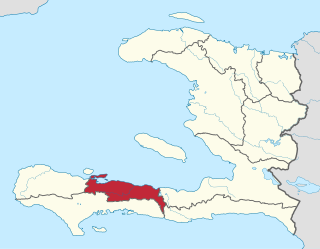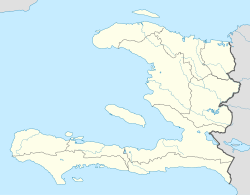
Haiti, officially the Republic of Haiti and formerly called Hayti, is a country located on the island of Hispaniola, east of Cuba in the Greater Antilles archipelago of the Caribbean Sea. It occupies the western three-eighths of the island, which it shares with the Dominican Republic. Haiti is 27,750 square kilometres (10,714 sq mi) in size and has an estimated 10.8 million people, making it the most populous country in the Caribbean Community (CARICOM) and the second-most populous country in the Caribbean as a whole.

The recorded written history of Haiti began on 5 December 1492 when the European navigator Christopher Columbus happened upon a large island in the region of the western Atlantic Ocean that later came to be known as the Caribbean. It was inhabited by the Taíno, and Arawakan people, who variously called their island Ayiti, Bohio, or Kiskeya(Quisqueya). Columbus promptly claimed the island for the Spanish Crown, naming it La Isla Española, later Latinized to Hispaniola. French influence began in 1625, and French control of what was called Saint-Domingue—modern-day Haiti—began in 1660. From 1697 on, the western part of the island was French and the eastern part was Spanish. Haiti became one of the wealthiest of France's colonies, producing vast quantities of sugar and coffee and depended on a brutal slave system for the necessary labor. Inspired by the message of the French Revolution, Haitian slaves rose up in revolt in 1791 and after decades of struggle the independent republic of Haiti was officially proclaimed in 1804.

Jean-Claude Duvalier, nicknamed "Baby Doc", was the President of Haiti from 1971 until he was overthrown by a popular uprising in 1986. He succeeded his father François "Papa Doc" Duvalier as the ruler of Haiti after his death in 1971. After assuming power, he introduced cosmetic changes to his father's regime and delegated much authority to his advisors. Thousands of Haitians were killed or tortured, and hundreds of thousands fled the country during his presidency. He maintained a notoriously lavish lifestyle while poverty among his people remained the most widespread of any country in the Western Hemisphere.
Matthieu Prosper Avril is a Haitian political figure who was President of Haiti from 1988 to 1990. A trusted member of François Duvalier's Presidential Guard and adviser to Jean-Claude Duvalier, Lt. Gen. Avril led the September 1988 Haitian coup d'état against a transition military government installed after Jean-Claude Duvalier's 1986 overthrow. He was President until March 1990, in a period which according to Amnesty International was "marred by serious human rights violations". He was arrested in 2001, but released in March 2004 after the 2004 Haitian coup d'état overthrew Jean-Bertrand Aristide.

Jean Vilbrun Guillaume Sam was President of Haiti from 4 March to 27 July 1915. He was a cousin of Tirésias Simon Sam, Haiti's president from 1896 to 1902.

Haitian Americans are Americans of Haitian descent. The largest proportion of Haitians in the United States live in the South Florida area and especially the cities of Tampa and Orlando. In addition, they have settled in major East Coast cities such as New York City, Boston, Philadelphia, and Washington, D.C., and in Chicago in the Midwestern United States. Most are immigrants or their descendants from late 20th-century migrations to the United States. Haitian Americans represent the largest group within the Haitian diaspora.
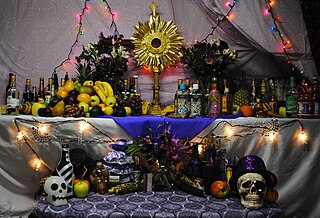
Haitian Vodou is a syncretic religion practiced chiefly in Haiti and the Haitian diaspora. Practitioners are called "vodouists" or "servants of the spirits".

Michèle Bennett is the former First Lady of Haiti and the ex‑wife of former President of Haiti, Jean‑Claude Duvalier. They fled to France together when he resigned in 1986; they divorced in 1990.

Haiti has a sizable diaspora, present chiefly in the Dominican Republic, the United States, Canada, Cuba, the Bahamas, and France. They also live in other countries like Belgium, Jamaica, Turks and Caicos, Mexico, U.S. Virgin Islands, Brazil and Chile, among others.
The 1994 Caribbean Cup was the sixth edition of the Caribbean Cup, the football championship of the Caribbean, one of the CONCACAF zones. The final stage was hosted by Trinidad and Tobago.
Immigration equality is a citizens' equal ability or right to immigrate their family members. It also applies to fair and equal execution of the laws and the rights of non-citizens regardless of nationality or where they are coming from. Immigration issues can also be a LGBT rights issue, as government recognition of same-sex relationships vary from country to country.

Chile–Haiti relations are the bilateral relations between Chile and Haiti. Chile has an embassy in Port-au-Prince. Haiti has an embassy in Santiago. Both countries are members of Organization of American States.

The 1991 Haitian coup d'état took place on 29 September 1991, when President Jean-Bertrand Aristide, elected eight months earlier in the 1990–91 Haitian general election, was deposed by the Armed Forces of Haiti. Haitian military officers, primarily Army General Raoul Cédras, Army Chief of Staff Phillipe Biamby and Chief of the National Police, Michel François led the coup. Aristide was sent into exile, his life only saved by the intervention of US, French and Venezuelan diplomats.
The St. Jean Bosco massacre took place in Haiti on 11 September 1988. At least 13 people were killed and around 80 wounded in a three-hour assault on the Saint-Jean Bosco church in Port-au-Prince, which saw the church burned down.

R v Immigration Officer at Prague Airport [2004] UKHL 55 is a UK asylum case concerning Article 33 of the Convention Relating to the Status of Refugees.
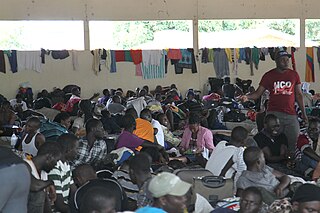
A Haitian Brazilian is a Brazilian person of full, partial, or predominantly Haitians ancestry, or a Haitian-born person residing in Brazil.
The Anti-Duvalier protest movement was a series of demonstrations in Haiti from 23 May 1984 – 7 February 1986, that led to the overthrow of President Jean-Claude Duvalier and the Duvalier dynasty regime.

During a refugee crisis that began in 1991, the US Coast Guard began to collect Haitian refugees and take them to a refugee camp at Guantanamo Bay. They were fleeing by boat after Jean-Bertrand Aristide, the democratically elected president of Haiti, was overthrown and the military government was persecuting his followers. The first camp reached a maximum of 12,500 people. It was then reduced to 270 refugees who either had HIV or were related to someone who did. The reduction was made possible by the US reemploying a policy of strict repatriation for both those found at sea and many living in Guantanamo. The HIV+ refugees were quarantined in a section of the military base known as Camp Bulkeley and faced human rights violations. They were brought to the United States after US District Judge Sterling Johnson, Jr. ruled the camp was an "HIV prison camp."

The Duvalier dynasty was an authoritarian family dictatorship in Haiti that lasted almost twenty-nine years, from 1957 until 1986, spanning the rule of the father and son pair François Duvalier and Jean-Claude Duvalier.
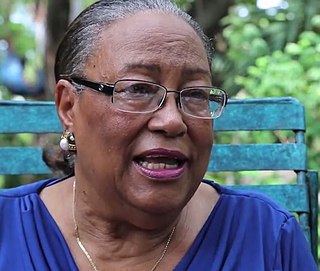
Suzy Castor is a Haitian historian, educator and human rights activist.
